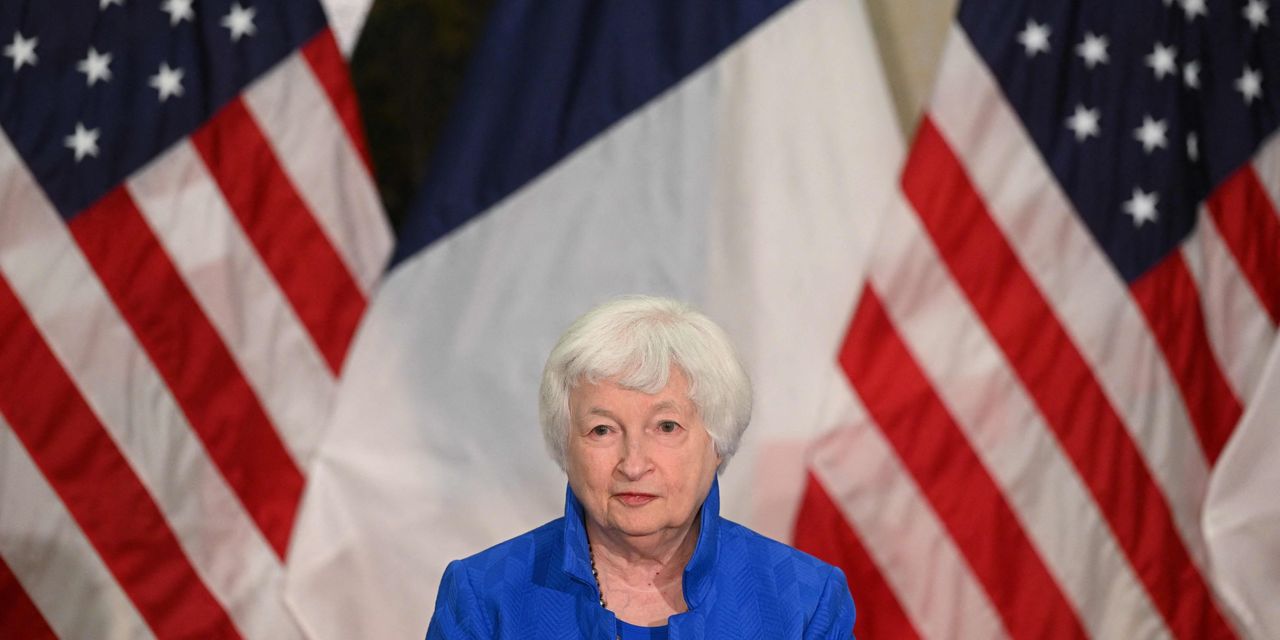Treasury Secretary Janet Yellen will travel to China this week to meet with senior Chinese government officials in an attempt to repair a partnership that has frayed after years of political conflict and trade wars, but remains the global economy’s most important pairing.
The trip is part of the Biden administration’s effort to deepen communication between the U.S. and China, following a November meeting between President Joe Biden and Chinese President Xi Jinping and a trip last month to China by Secretary of State Antony Blinken.
Here are three major themes for investors to watch during Yellen’s Thursday-Sunday trip.
Semiconductor squabbles
Shares of high-flying computer chip maker Nvidia Corp.
NVDA,
took a hit last week after the Wall Street Journal reported that the Biden administration may expand its export bans on artificial intelligence-related technology the company specializes in.
The export bans could impact chips that NVDIA created specifically to conform to prior restrictions on chip exports and could effect sales of chips from competitors like Advanced Micro Devices Inc.
AMD,
and and Intel Corp.
INTC,
as well.
Nvidia Chief Financial Office Collette Kress said last week that the move wouldn’t have “immediate material impact on our financial results” due to the “strength of our products abroad,” though she added that in the long run such restrictions “would result in a permanent loss of opportunities for U.S. industry to compete and lead in one of the world’s largest markets.”
The statement underscores the uncertainty over the Biden administration’s commitment to doing whatever it takes to hamstring the development of AI technology in China — whether the sort of export restrictions contemplated are about style than substance, and whether they can really be effective at stemming the transfer of strategic technologies to foreign rivals.
“There are questions though about just how effective these export controls on chips are with recent reports of Chinese gaining access through a mix of smuggling and renting through the cloud,” said Owen Tedford, an analyst with Beacon advisors, in a recent note to clients.
Chip company Micron Technology Inc.
MU,
could also be in focus after the company said last month that half of its China customer revenue could be at risk after Chinese authorities banned critical infrastructure operators in the country from using Micron products.
The Biden administration is also considering new restrictions on outbound investment to China, motivated in part by bipartisan legislative efforts that could require the Commerce Department to set up a screening mechanism for outbound investment to identify deals that might harm national security.
The effort marks “a consequential shift” in U.S. economy policy, according to Isaac Boltansky, director of policy research at BTIG. “It will introduce a new screening process, ongoing monitoring and could be a headwind for the tech space in particular,” he wrote in a Sunday note.
While the program will likely initially be targeted a the semiconductor industry, “our sense is the preliminary strictures will be used to build a broader investment framework over time,” he added.
U.S. industrial policy
Yellen criticized China in a April speech for turning away from “market reforms” that triggered the country’s “impressive rise” in recent decades, toward “a more state-driven approach that has undercut its neighbors and countries around the world.”
At the same time, the Biden administration has itself been trumpeting what the president last week called “a fundamental break” with U.S. economic policy of the past 40 years, toward a model in which the state takes a much larger role in economic development.
The Bipartisan CHIPS act and last year’s Inflation Reduction Act have helped usher in a new era of industrial policy in the U.S., whereby the federal government becomes a major partner, subsidizing investment in industries, like semiconductors
SMH,
and electric car manufacturing, deemed to be of importance to national security.
Yellen’s visit could help put a finer point on what limits the Biden administration sees in this approach, and where it draws the line between necessary investments and unfair subsidization of industry.
Repairing the U.S.-China relationship
Despite U.S.-China tensions, trade in goods between the two countries set a record of $690 billion last year, according to the Commerce Department, and the economies are so intertwined that Yellen will be unable to address all the important nexuses in a single visit.
Michael Hirson, head of China research at 22V Research, argued in a Monday note that contentious issues like the Trump-era trade tariffs are matters for Congress and the Commerce Department to decide and therefore will likely not be addressed by Yellen.
“Yellen’s trip has the more modest, but still very important goal, of establishing channels of communication with China’s new economic team,” he wrote.
“Such conversations will help to reduce the potential for miscalculation and misunderstanding — including on issues such as Beijing’s economic and technological support for Moscow, where the potential for China to cross U.S. redlines could result in significant sanctions and export control risks.”
He argued that these lines of communication could be “quite beneficial” for the global economy and markets, especially in the event of a major macroeconomic shock.
“Should the stresses on China’s economy intensify in coming quarters, having such channels in place — so that Yellen can call [Chinese Vice Premier] He Lifeng , or vice versa as necessary — will be important for reducing uncertainty for global markets,” he wrote.
Read the full article here




